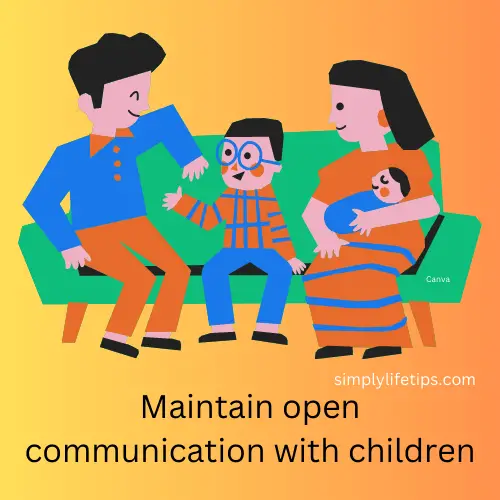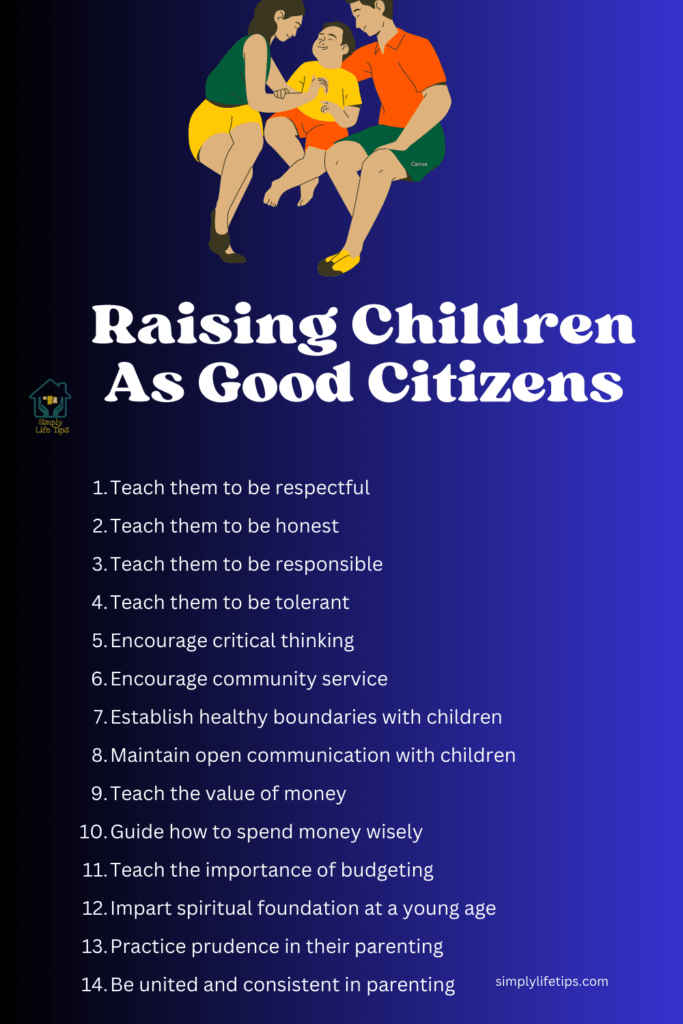Raising children as good citizens is one of the most important goals of parenting. It is the responsibility of parents to teach their children values such as kindness, respect, empathy, and responsibility. Children need to learn how to interact with the world around them in a positive manner and how to contribute to society in a meaningful way. In this way, they can grow up to become productive members of society who make a positive impact on the world. In this blog, let’s discuss a few easy tips for parents helpful in raising children as good citizens.
Raising Children As Good Citizens
Parenting is a complex field that is heavily influenced by the conflicts and challenges of modern times. Compared to previous generations, today’s parents face an increased level of difficulty in nurturing their children. A major obstacle is the fact that both parents often work outside of the home, leaving little time for them to adequately care for their children.
Unfortunately, there are numerous instances where children are neglected due to their parents’ pursuit of money, career, and status. In modern times, parents often try to fulfil all of their children’s desires and allow them maximum freedom, hoping to provide them with everything that they themselves lacked during childhood. However, this approach can sometimes result in children being neglected as their parents prioritize other aspects of their lives over their children’s well-being.
Parents choose to ignore their children’s faults
Some parents fail to discipline their children appropriately and excuse their behaviour with the phrase “He is just a child.” A new parenting trend has emerged where parents aim to excessively be cordial to their children, but this approach can prevent children from developing self-discipline, responsibility, and accountability. It can also lead to entitlement and a lack of respect for authority.
Raising Children As Good Citizens – Tips for Parents
Every parent wants their children to grow up to be responsible citizens. As a parent, it is our responsibility to guide and nurture our children into becoming good citizens. Here are some tips on how to help children grow up as good citizens.
Teach them to be respectful
Respect is one of the most important qualities that a good citizen must possess. Teach your children to respect everyone, irrespective of their age, gender, religion, or culture. Encourage them to use words like ‘please’ and ‘thank you‘ and show gratitude towards others.
Teach them to be honest
Honesty is the foundation of good citizenship. Teach your children to always tell the truth, even if it is difficult. Encourage them to take responsibility for their actions, and to admit when they have made a mistake.
Teach them to be responsible
Responsibility is another important quality that children must learn. Teach them to be responsible for their actions, and to take ownership of their mistakes. Encourage them to be accountable for their homework, chores, and other responsibilities.
Teach them to be tolerant
Tolerance is an important value that every good citizen must possess. Teach your children to respect and accept people who are different from them. Encourage them to embrace diversity, and celebrate the differences that make us unique.
Encourage critical thinking
Critical thinking is an essential skill that children must develop to become good citizens. Encourage them to question what they read and hear, and to form their own opinions based on facts and evidence. Teach them to think critically about issues and to make informed decisions.
Encourage community service

Community service is a great way to instil a sense of responsibility in children. Encourage your children to volunteer at local charities, and participate in neighbourhood cleanups and other community service activities. This will not only help them develop a sense of community, but it will also teach them the importance of giving back.
Establish healthy boundaries with children
Not teaching children to respect authority and instead giving in to their crying and obstinance can lead to this behaviour continuing into adulthood. Punishment and discipline become less effective as children grow older, so it’s important to establish healthy boundaries early on and teach children to respect authority. Parents should deny their children’s demands, explain their decisions, and not give in to their child’s behaviour to prevent negative consequences in the future.
Maintain open communication with children

Children who are consistently given what they want without any boundaries or consequences may develop a sense of entitlement, causing them to become accustomed to always getting their way. This can lead to children exploiting their parents’ silence and parents losing control. In extreme cases, children may become aggressive and even resort to attacking their parents for financial gain. To avoid these negative outcomes, parents should establish healthy boundaries, teach their children to value respect and gratitude, maintain open communication, and seek professional help if necessary.
Teach the value of money
Parents have a crucial role to play in teaching their children the value of money and how to spend it wisely. It is not necessary to fulfil every desire of their children as it can lead to them becoming prodigals. Children who grow up knowing the importance of money and the scarcity of resources are more likely to learn how to be responsible with their finances. Therefore, parents should encourage their children to understand the value of money and how to use it prudently. Make them understand money cannot buy everything required in life.
Guide how to spend money wisely

It is also essential to monitor their spending and guide them on how to spend money wisely. Parents should inquire about their children’s requirements and teach them how to prioritize their expenses. Excessive wealth and money can corrupt young minds, leading to the development of a money craze that can ultimately result in criminal activities like drug abuse and smuggling. Parents should also teach their children the importance of hard work and earning money through honest means. By instilling these values in their children, parents can help raise responsible and respectable individuals who understand the true value of money.
Teach the importance of budgeting
It is important for a family to value money, but it should not convey the message to their children that money is the ultimate source of control. Children need to be aware of the concept of scarcity and understand the importance of budgeting. If parents give their children everything they never had as they grew up in poverty, they may unintentionally spoil their children. There should be financial discipline in the family.
Impart spiritual foundation at a young age

Imparting a spiritual foundation in your children at a young age is crucial. This does not mean indoctrinating them to blindly follow a particular religion, but rather instilling in them spiritual values such as kindness, love, mercy, and charity. These fundamental values should be learned within the family, and children should be able to witness mutual love and sharing between their parents as they grow up. Teach them how radical kindness transforms children.
Practice prudence in their parenting
When parents excessively gratify their children’s desires, the children may respond with tantrums or anger when their requests are denied. It is important for parents to practice prudence in their parenting approach to prevent such behaviour. If children respond appropriately when their requests are denied, it is a sign of a successful upbringing. However, if children become furious or adamant, there may be underlying issues that need to be addressed. Parents should balance fulfilling their children’s needs with teaching them the value of patience, discipline, and responsibility.
Be united and consistent in parenting
It is important for parents to be united and consistent when setting boundaries and disciplining their children. If one parent says “no” and the other secretly provides what the child wants, it sends mixed signals and can undermine the authority of the parent who said “no.” This may lead to the child exploiting the softness of the parent who gives in, making it challenging for the other parent to enforce discipline. Therefore, parents must be bold enough to say “no” whenever necessary and stick to their decisions, even if it is difficult or unpopular with their children. By being united and consistent in their parenting, parents can establish healthy boundaries and teach their children to respect authority.

Selfishness and stubbornness can be equally harmful to both the family and society. Often, in marital relationships, one partner’s self-willed nature can create issues. Therefore, it is important to raise children as kind, considerate, and empathetic individuals from a young age.
Children raised by parents who spend quality time with them and maintain a loving relationship are less likely to go astray when they reach adulthood.
If your kids see you volunteering, working with charities and helping others, you’ll help them discover that being nice is its own reward. PBS Kids
Final Thoughts
In conclusion, it is crucial for parents to focus on raising their children as good citizens. This requires teaching them values such as kindness, empathy, respect, and responsibility from an early age. Parents must lead by example and spend quality time with their children, fostering strong relationships and building a solid foundation for their children’s future. By doing so, children can grow up to be responsible and caring members of society, contributing positively to their communities and the world at large.
What are the methods you follow in raising children as good citizens?
Thank you for your visit.
Don’t forget to share it.
Leave your thoughts in the comment box below.
Chat

Mathukutty P. V. is the founder of Simply Life Tips. He is a Blogger, Content Writer, Influencer, and YouTuber. He is passionate about learning new skills. He is the Director of PokketCFO.
He lives with the notion of “SIMPLE LIVING, CREATIVE THINKING”. He Believes – “Sharing is caring.” and “Learning never ends.”



